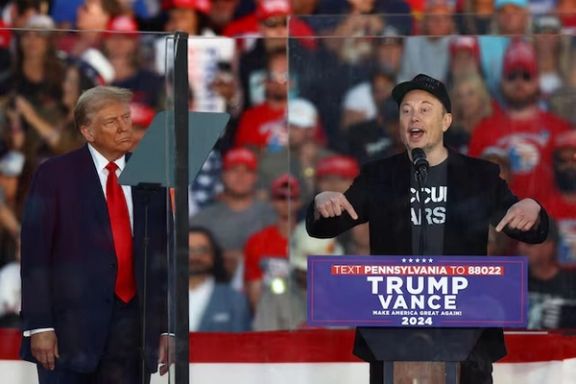Will Trump choose dialogue or pressure in dealing with Iran?

The Iran hawks chosen by president-elect Donald Trump mark a major shift in US-Iran policy, signaling early steps toward change in Iran, a Middle East expert and former British Army officer told the Eye for Iran podcast.
Major (ret) Andrew Fox, who completed tours in Afghanistan, including one attached to the US Army Special Forces, said the likes of Marco Rubio as Secretary of State spell trouble for Tehran but the road to regime change is not in the cards - at least for now.
“Regime change is exceptionally challenging because if you knock off a regime, then you create a vortex. And so, you must have something there to fill that vortex that is consistent and compelling because otherwise you end up spending 20 years there and for example, replacing the Taliban with the Taliban,” said Fox.
Fox acknowledged the strong anti-Islamic Republic sentiments both within Iran and abroad, as well as public calls for "regime change." However, he cautioned that this does not indicate a solid plan exists or that such change is feasible in the near term.
“I'm just sad that it's fairly pessimistic when it comes to Iran. I hope that there is a resolution to this in due course. And that's what I'll be hoping for the next four years under the new president,” added Fox.
Imposing extensive economic sanctions and increasing diplomatic isolation on Iran—steps that Fox and many Iran watchers view as Trump’s top priority—could significantly weaken the Islamic Republic.
Combined with Israel's near-elimination of Iran’s proxy deterrence, this suggests that Tehran is rapidly running out of options.
Depending on how Iran engages with the new US administration, it’s possible they may accelerate their push for nuclear power status as a strategy to regain the deterrence they have lost.
A weak Islamic Republic is the first step in a long process of "regime change," Fox told Eye for Iran. It’s all about ‘baby steps’, he added.
In a recent interview with Podcaster Patrick Bet David, Trump was asked about the possibility of supporting political change in Iran. "We can't get totally involved in all that," Trump said. The interview was conducted just weeks before he was elected president of the United States.
The priority of the new administration is on limiting Iran’s aggression in the region and preventing it from becoming a nuclear power.
Iran will be faced with a decision: deal with the United States or double down, Fox argued.
He referred to the concept of the so-called "Big Satan" (Iran's term for the US) and "Little Satan" (a derogatory term used by the Islamic Republic for Israel), suggesting that any talks would be unproductive and unlikely to progress meaningfully.
In 2019, Trump tasked then-Japanese Prime Minister Shinzo Abe to mediate talks in a trip to Iran that turned into a failed mediation effort. He was the first Japanese leader to visit Iran in four decades, but it ended in a rebuff when Supreme Leader Ali Khamenei told Abe, "No negotiations with Trump."
“I don't think we're at a point yet where we can articulate a clear pathway to Iran finding its way back to where it was in decades gone before. But what we must do is make sure that Iran can't destabilize outside its borders and then we can turn our attentions to a very long road to fixing what's going wrong inside its borders,” said Fox.
Talking may be in the books, but it might not lead anywhere, he emphasized.
That was evidenced by Elon Musk, a close advisor to President-elect, meeting recently with Iran's ambassador to the UN, Amir Saeid Iravani.
There has been a lot of backlash from the Iranian diaspora and confusion on the apparent Musk-Iran meeting. The goal might have been to test if there is a chance for Iran to back down and the administration to bring calm to the region.
Alex Vatanka, the founding Director of the Iran Program at the Middle East Institute, told Iran International in a previous interview that Trump’s refusal to appoint former Ambassador Nikki Haley, or former Secretary of State Mike Pompeo, may be due to his desire not to go to war.
So far, figures like Marco Rubio, Elise Stefanik, Pete Hegseth, and Mike Waltz have all aligned with the "America First" agenda, prioritizing domestic policy over international involvement—a stark contrast to neo-conservatives like Haley and Pompeo.
Fox sees an exception to that golden rule.
To him, America First is “America First except when it comes to Israel,” he said and added that the upcoming Trump Administration is the most pro-Israel administration in history.
“Mike Huckabee is to be the ambassador. He's a guy that said that Palestine doesn't exist. That's not helpful for a long-term peace process.” added Fox.
If Iran continues to strike Israel, the Americans will get involved in some sort of confrontation with Iran to protect Israel.
But again – "the goal would not be regime change" – but to scale back Iran’s aggression in such a matter.
Much of what will unfold, despite what the US has in the works, will depend on how Iran acts.
"If you make the regime poorer, this is going to be the first baby steps in some kind of regime change further down the line," said Fox.
You can watch the full episode of Eye for Iran featuring Andrew Fox on YouTube, or listen on Spotify, Castbox, Apple or Amazon.